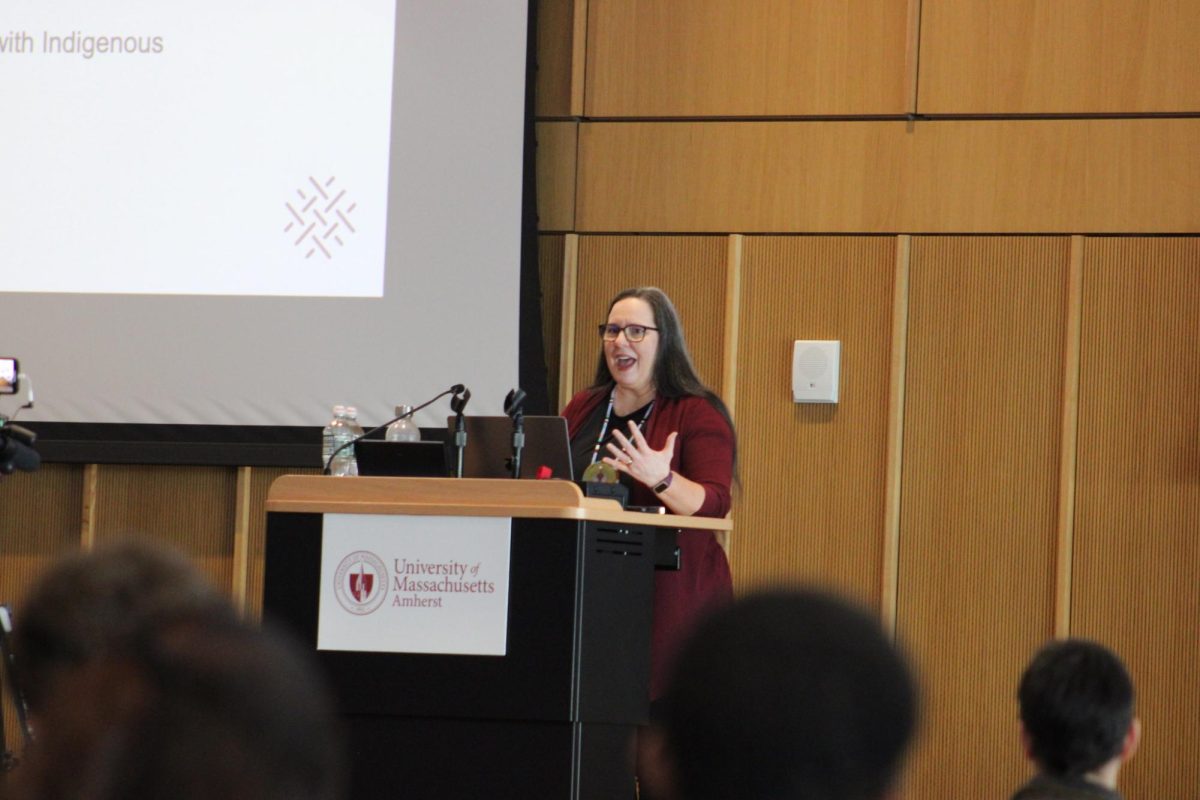On the evening of Tues., March 12, the Commonwealth Honors College (CHC) held its annual Daffodil Lecture with keynote speaker Sonya Atalay, a provost professor of anthropology at the University of Massachusetts and the inaugural director of the Center for Braiding Indigenous Knowledges and Science (CBIKS).
This marks the 10th Daffodil Lecture since its inception, with the purpose of bringing awareness to environmental science breakthroughs.
“[The lectures] become a space for community members to learn from one another on how to deal with our current climate crisis,” Mari Castañeda, communications professor and CHC dean, said.
Chosen to speak this year, Atalay worked to create CBIKS, which was born in September of 2023 and is a groundbreaking center for UMass — and around the globe — in regards to Indigenous studies and knowledge.
“CBIKS’ vision looks forward to 2033; after a decade of CBIKS, we see a world where braiding Indigenous knowledge and western science is at the forefront of scientific inquiry and an enhanced workforce of students, scientists and Indigenous communities have the skills and training to conduct and apply braided methodologies,” Atalay said.
Atalay first had the idea of CBIKS two years ago after receiving news of new grants being given by the National Science Foundation (NSF). She never believed the NSF would accept a proposal to integrate Indigenous knowledge into science.
While getting slightly emotional, Atalay described how applying for the grant “was a long shot,” but she likes to think “it was an ancestor whispering in my ear” that motivated her to keep pushing for CBIKS.
“CBIKS is the first [science and technology center (STC)] that is grounded in the social sciences,” said Atalay, “To have an STC that’s focused on indigenous science and in the social sciences is truly groundbreaking.”
“This marks a major shift in thinking from the past, and it fills me with hope for the future,” Atalay added.
CBIKS is funded for five years for $30 million with an option to renew for an additional five years and $30 million, making it the largest grant awarded to UMass.
“This is the single largest [National Science Foundation] investment in Indigenous science and the most substantial investment in Indigenous science that we know of anywhere,” Atalay said.
CBIKS reaches globally with regional hubs in eight locations connecting with Indigenous communities all over.
“We also include elders, youth and indigenous language speakers, in order to create a supportive, connected and intergenerational global community of indigenous scientists who are skilled in braiding Indigenous and western science,” Atalay said.
“After all, our people, Indigenous people have always been scientists and applied that science to flourish and adapt through millenniums of climate change,” Atalay said. “CBIKS acknowledges and honors the sciences of our ancestors and builds upon it.”
While using the analogy of a basket being woven piece by piece, Atalay discussed all the different aspects of study that CBIKS reaches through their work, such as “climate change, care and protection of cultural places, and food security.”
The CBIKS website notes that they are designed to “provide models, practices, methods, and ethical guidelines for braiding Indigenous knowledge and science together with current science practices.”
“We see this research as both timely and relevant because Indigenous knowledge, which has long been marginalized, is increasingly recognized and valued as a partner in environmental problem solving,” Atalay said.
“I think [CBIKS] really does give a lot of hope. I completely agree in terms of what could be possible. Another world is possible if we collaborate and work together,” Castañeda said.
As the screen behind Atalay featured all of the Indigenous and non-Indigenous people who helped with CBIKS, she said, “We collectively dreamed of the impossible, and we put heart and commitment to bring that dream to reality.”
Alexandra Hill can be reached at [email protected]




















